Théo Bontempelli
Let's Get It Started: Fostering the Discoverability of New Releases on Deezer
Jan 05, 2024


Abstract:This paper presents our recent initiatives to foster the discoverability of new releases on the music streaming service Deezer. After introducing our search and recommendation features dedicated to new releases, we outline our shift from editorial to personalized release suggestions using cold start embeddings and contextual bandits. Backed by online experiments, we discuss the advantages of this shift in terms of recommendation quality and exposure of new releases on the service.
Track Mix Generation on Music Streaming Services using Transformers
Jul 06, 2023


Abstract:This paper introduces Track Mix, a personalized playlist generation system released in 2022 on the music streaming service Deezer. Track Mix automatically generates "mix" playlists inspired by initial music tracks, allowing users to discover music similar to their favorite content. To generate these mixes, we consider a Transformer model trained on millions of track sequences from user playlists. In light of the growing popularity of Transformers in recent years, we analyze the advantages, drawbacks, and technical challenges of using such a model for mix generation on the service, compared to a more traditional collaborative filtering approach. Since its release, Track Mix has been generating playlists for millions of users daily, enhancing their music discovery experience on Deezer.
Flow Moods: Recommending Music by Moods on Deezer
Jul 15, 2022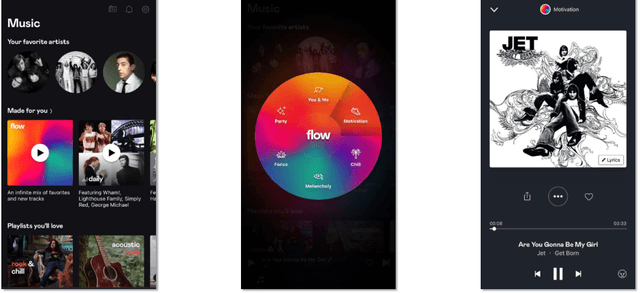
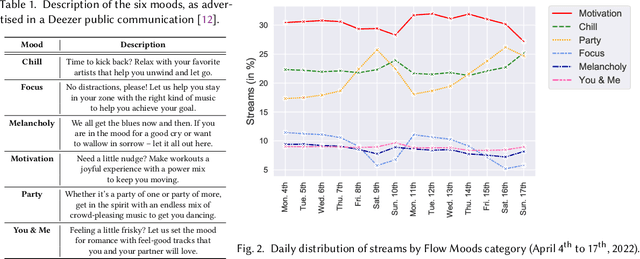
Abstract:The music streaming service Deezer extensively relies on its Flow algorithm, which generates personalized radio-style playlists of songs, to help users discover musical content. Nonetheless, despite promising results over the past years, Flow used to ignore the moods of users when providing recommendations. In this paper, we present Flow Moods, an improved version of Flow that addresses this limitation. Flow Moods leverages collaborative filtering, audio content analysis, and mood annotations from professional music curators to generate personalized mood-specific playlists at scale. We detail the motivations, the development, and the deployment of this system on Deezer. Since its release in 2021, Flow Moods has been recommending music by moods to millions of users every day.
Carousel Personalization in Music Streaming Apps with Contextual Bandits
Sep 30, 2020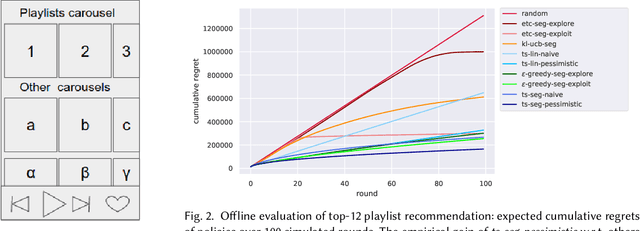
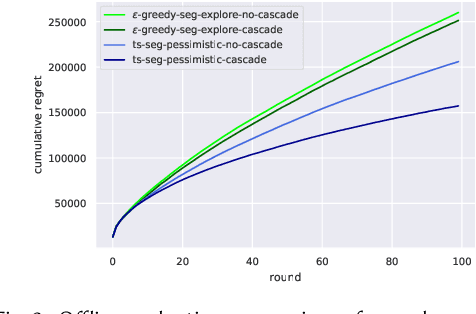
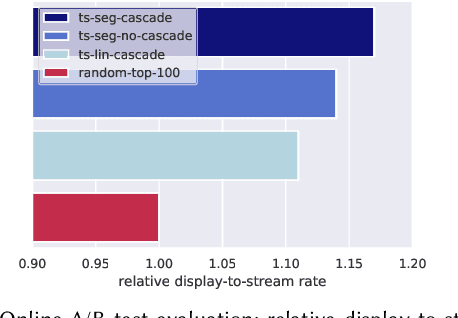
Abstract:Media services providers, such as music streaming platforms, frequently leverage swipeable carousels to recommend personalized content to their users. However, selecting the most relevant items (albums, artists, playlists...) to display in these carousels is a challenging task, as items are numerous and as users have different preferences. In this paper, we model carousel personalization as a contextual multi-armed bandit problem with multiple plays, cascade-based updates and delayed batch feedback. We empirically show the effectiveness of our framework at capturing characteristics of real-world carousels by addressing a large-scale playlist recommendation task on a global music streaming mobile app. Along with this paper, we publicly release industrial data from our experiments, as well as an open-source environment to simulate comparable carousel personalization learning problems.
 Add to Chrome
Add to Chrome Add to Firefox
Add to Firefox Add to Edge
Add to Edge